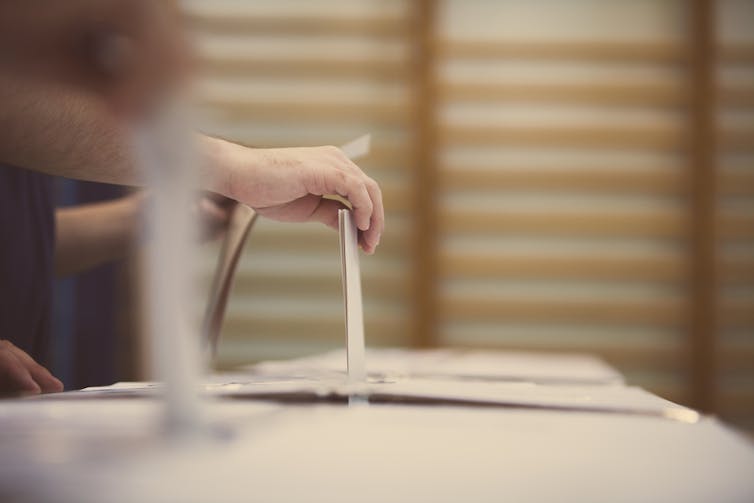
Disinformation and foreign interference constitute a grave threat to Western democracies, particularly during elections.
Both the 2016 US election and the 2019 UK election were targeted by Russian disinformation campaigns. Already, we are seeing disinformation operations in the lead-up to the Australian federal election targeting both parties – and the election system itself.
In his annual threat assessment speech this year, ASIO director Mike Burgess said one of the most insidious things about foreign interference is that it uses our very own strengths against us:
[…] the perpetrators exploit our values, freedoms and trust, to undermine our values, freedoms and trust.
Distorting voting decisions
The threat of foreign interference and disinformation is threefold.
First, democracy depends on true information for citizens to connect their preferences to voting choices and hold governments accountable. Disinformation can distort people’s understandings of issues and candidates, so they may make choices they otherwise would not.
We’ve already seen how disinformation on COVID has influenced people’s attitudes and actions, not only when it comes to their health decisions (such as whether to get a vaccine), but also their political choices.
Disinformation about the public health threat, for example, could cause people to vote for a minor party or candidate that has made the removal of all restrictions and mandates a central political platform.

Shaping policy by influencing election outcomes
Second, the involvement of a foreign actor in disinformation further undermines democracy as it subjects our domestic politics not to the will of our people, but to that of a foreign government.
Burgess revealed in the threat assessment that ASIO had interrupted an operation involving an Australian-based individual with ties to a foreign intelligence service. This person worked to identify and promote candidates favourable to the interests of a foreign government.
Reporting by the ABC indicated the foreign government was Russia and the Australian-based person had “close links” to President Vladimir Putin’s regime.
Russia is already waging an information war alongside its war of aggression against Ukraine. It appears it has also sought to interfere in one of our elections. With Australia providing military support for Ukraine, Russia may seek to continue its efforts to covertly interfere in Australian politics in retaliation.
Undermining support for democracy
Third, disinformation and foreign interference might not target a specific party or policy, but it may seek to simply undermine support for our democratic political system. It targets trust in our democracy.
Recent examples include efforts to recycle conspiracy theories from the United States that Dominion voting machines will be used in Australia and that these machines will alter vote counts.
There is no credible evidence that Dominion machines have switched votes in the 2020 US presidential election, and Australia does not even use such machines. But this conspiracy, pushed by some supporters of former US President Donald Trump, has been imported to Australia.
The effect of such a claim could undermine trust in our electoral process and the legitimacy of a federal election.
In addition, there has been much talk about the number of pencils the Australian Electoral Commission is preparing for voters as a means to reduce the transmission risk of COVID and other infections.
Talk of ballots completed in pencils has given rise in the past to conspiracies that voting officials change the votes to insure a predetermined result. This is despite the fact most elections are observed throughout by members of multiple parties.
Nonetheless, this conspiracy may resurface during the upcoming federal election, as well.
In addition to efforts to support or oppose a party, policy, or even the legitimacy of our democracy, disinformation campaigns may seek to increase polarisation in our society by promoting a certain policy or party that reflects an extreme political view.
Polarisation makes it harder for political parties to reach agreement and for governments to enact policies or defend their actions to voters. And this, in turn, can play on the insecurities of citizens to move them to extreme political views.
Another way to undermine confidence in our political systems is to use multiple lines of disinformation and foreign interference at the same time.
We have seen evidence that the same actors promoting conspiracy theories about Dominion voting machines have also promoted false claims that Ukraine is rife with US bioweapons labs. These claims have been around for a long time and there is no truth to them.
The aim of these multiple lines of attack is to move the public against the Australian government’s support for Ukraine, as well as the US.
One single attack against a party or policy may not ultimately change many votes. But a wide-ranging set of attacks can reach a larger audience of persuadable voters and, over time, overwhelm the resistance of otherwise sceptical citizens.
At a minimum, these efforts can create confusion in the public so they do not know who to trust and what to believe.
Countering disinformation
How do we counter such threats? We have three recommendations.
First, a proactive counter-narrative needs to be found as an antidote to falsehoods and manipulation.
Political candidates have limited abilities to counter the disinformation targeting them as their responses can be cynically dismissed as strategic rather than authentic. But civil society actors and academics can point to specific operations, identify the actors and disclose their methods of manipulation.
We have seen elements of this with respect to the US strategy to rapidly declassify intelligence to counter Russian war plans in Ukraine.
Second, public statements by nonpartisan election officials to counter disinformation, as well as offering appropriate access to the way the voting process works, can provide transparency to voters. This can also counter conspiracy theories claiming people’s votes are not being fairly counted.
Finally, to the greatest extent possible without compromising their work, our intelligence agencies need to publicly disclose operations and the methods used by foreign actors to subvert our political process.
Intelligence agencies used to operate under the mantra, “the secret of our success is the secret of our success”. That is not always the case.
Michael Jensen has received funding from the Australian Research Council, Defence, Science, and Technology, and the Taiwan Ministry of Foreign Affairs. This research reflects solely the views of the authors.
Sascha-Dominik (Dov) Bachmann has received and is receiving funding from the Australian Department of Defence for research regarding grey zone and information operations targeting Australia. He is a Research Fellow with the Security Institute for Governance and Leadership in Africa, Faculty of Military Science, Stellenbosch University and is a Fellow Asia Pacific (Hybrid Threats and Lawfare) of NATO SHAPE, Belgium
This article was originally published on The Conversation. Read the original article.







